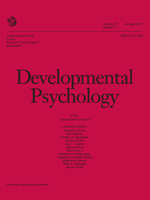
DEVELOPMENTAL PSYCHOLOGY
Scope & Guideline
Elevating Understanding of Development Across Lifetimes
Introduction
Aims and Scopes
- Cognitive Development:
Research on cognitive processes such as learning, memory, problem-solving, and executive functions in children and adolescents, examining how these abilities evolve over time. - Social and Emotional Development:
Exploration of how social interactions and emotional regulation impact developmental trajectories, including studies on empathy, prosocial behavior, and identity formation. - Gender and Identity Studies:
Investigations into how gender identity and expression develop, particularly in relation to societal norms and peer interactions, as well as the implications for well-being. - Family and Socioeconomic Influences:
Analysis of how familial dynamics, parenting styles, and socioeconomic factors shape developmental outcomes across various domains. - Cultural and Contextual Factors:
Examination of the role of cultural background and contextual variables in shaping developmental processes, emphasizing the importance of diverse perspectives. - Intervention and Educational Practices:
Research focused on practical applications of developmental psychology in educational settings and community interventions aimed at enhancing child and adolescent development.
Trending and Emerging
- Digital and Online Influence:
Research examining the impact of digital media and technology on children's learning, socialization, and mental health is increasingly prominent, particularly in the context of internet addiction and information literacy. - Intergroup Relations and Diversity:
Emerging studies focus on children's understanding and experiences of intergroup dynamics, including social exclusion and acceptance, with an emphasis on promoting inclusivity and understanding across different backgrounds. - Mental Health and Well-being:
An increasing number of papers investigate the links between developmental processes and mental health outcomes, emphasizing the importance of emotional well-being in childhood and adolescence. - Resilience and Coping Mechanisms:
Research on resilience, particularly in the context of socioeconomic adversity and family dynamics, is gaining attention, highlighting how children and adolescents navigate challenges. - Neuroscientific Approaches:
There is a growing trend towards integrating neuroscientific methods into developmental psychology research, exploring the biological underpinnings of cognitive and emotional development.
Declining or Waning
- Traditional Learning Models:
Research focused on rigid, traditional models of learning is becoming less prevalent as newer, more dynamic approaches to understanding cognitive development are gaining traction. - Single-Domain Studies:
Investigations that focus solely on one aspect of development without considering the interplay of cognitive, emotional, and social factors seem to be declining, reflecting a broader trend toward holistic approaches. - Static Assessments of Development:
The use of static measures that do not account for developmental trajectories or changes over time is decreasing, as researchers favor longitudinal studies that provide a more nuanced understanding of growth. - Overemphasis on Deficits:
Studies that primarily focus on deficits or problems in development, rather than strengths and resilience, are waning, indicating a shift towards more positive and strengths-based perspectives.
Similar Journals

Revista de Psicologia Clinica con Ninos y Adolescentes
Advancing pediatric mental health through innovative research.Welcome to the Revista de Psicologia Clinica con Ninos y Adolescentes, an esteemed academic journal published by UNIV MIGUEL HERNANDEZ, DEPT PSICOLOGIA, dedicated to advancing knowledge in the fields of clinical psychology, developmental psychology, and pediatric mental health. Since its inception in 2014, this Open Access journal has garnered a reputation for its commitment to disseminating cutting-edge research and practical insights, serving as an invaluable resource for researchers, practitioners, and students alike. With an impressive Q2 categorization across various disciplines in the 2023 rankings—including Clinical Psychology and Pediatrics—the journal holds significant merit in its rankings, demonstrating robust scholarly engagement. Nestled within the vibrant academic landscape of Spain, the journal aims to foster interdisciplinary collaboration and promote awareness of psychological issues affecting children and adolescents. By publishing high-quality empirical studies, theoretical papers, and reviews, the Revista de Psicologia Clinica con Ninos y Adolescentes plays a pivotal role in advancing the scientific dialogue within the field, making it an essential resource for anyone dedicated to improving mental health outcomes for younger populations.
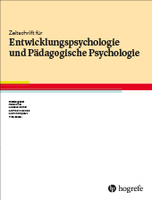
ZEITSCHRIFT FUR ENTWICKLUNGSPSYCHOLOGIE UND PADAGOGISCHE PSYCHOLOGIE
Innovating Insights for Developmental and Educational SuccessZEITSCHRIFT FUR ENTWICKLUNGSPSYCHOLOGIE UND PADAGOGISCHE PSYCHOLOGIE, published by HOGREFE VERLAG, is a pivotal academic journal based in Germany that focuses on the intricate fields of developmental and educational psychology. With an emphasis on innovative research and the latest theoretical developments, this journal aims to bridge the gap between psychological theory and educational practice. It holds a commendable Q3 ranking in Developmental and Educational Psychology and an impressive Q2 ranking in the broader field of Education, underscoring its relevance and contribution to the academic discourse. Although it does not currently offer Open Access options, the journal continues to provide substantial insights and findings that are crucial for researchers, educators, and students alike, thereby fostering advancements in both psychological research and educational methodologies. Spanning topics from childhood development to pedagogical strategies, this journal serves as an essential platform for disseminating knowledge within these interconnected fields.

BRITISH JOURNAL OF EDUCATIONAL PSYCHOLOGY
Elevating understanding of psychological principles in education.The British Journal of Educational Psychology (BJEP), published by Wiley, stands as a leading platform in the fields of Developmental and Educational Psychology and Education. Since its inception in 1931, BJEP has consistently delivered high-quality, peer-reviewed research that addresses critical issues and advances knowledge within the educational sphere. With a commendable impact factor and a prominent Q1 ranking in both the Developmental and Educational Psychology categories, the journal boasts an impressive standing among its peers, reflected by its rankings in Scopus (Rank #101 out of 1543 in Social Sciences – Education and Rank #35 out of 360 in Developmental Psychology). Researchers, educators, and students alike will find valuable insights and innovative practices that shape learning and teaching in diverse contexts. Although currently not available as open access, the journal remains dedicated to disseminating pivotal findings that contribute to effective educational psychology practices worldwide. Explore the rich tapestry of knowledge that BJEP offers, crafted from contributions across the globe at the forefront of educational research.

Educational and Developmental Psychologist
Exploring the intersection of education and psychology.The Educational and Developmental Psychologist is a premier journal dedicated to advancing research and practice in the fields of educational and developmental psychology, published by Taylor & Francis Ltd. With an ISSN of 2059-0776 and an E-ISSN of 2059-0784, this journal has established itself as a key resource for researchers and practitioners alike, providing a platform for innovative studies that bridge theory and application. With a 2023 Scopus ranking placing it in the top 73rd percentile in Education and 58th in Developmental Psychology, it highlights significant findings that are shaping educational practices globally. Operating from the United Kingdom, this journal is committed to disseminating high-quality, peer-reviewed research that is crucial for professionals addressing the challenges encountered in educational settings. Although it is not an open-access journal, its impact on educational psychology is noteworthy, reflecting rigorous standards in its publication process. The journal's scope encompasses a wide variety of topics, promoting an interdisciplinary dialogue that is essential for the advancement of knowledge in education.
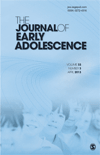
JOURNAL OF EARLY ADOLESCENCE
Pioneering Research in Developmental Psychology and EducationJOURNAL OF EARLY ADOLESCENCE, published by SAGE PUBLICATIONS INC, serves as a vital resource for researchers and practitioners in the fields of developmental psychology, education, and sociology. With an impressive history dating back to 1981 and a scope that spans pivotal studies on the social and emotional development of adolescents, this journal has carved a niche in advancing knowledge and understanding in early adolescent development. The journal boasts a notable impact factor, underscored by its Q2 ranking in Developmental and Educational Psychology and Life-span and Life-course Studies, along with a Q1 ranking in Sociology and Political Science for 2023. Its current Scopus rankings indicate strong scholarly influence, ranking #72/604 in Social Sciences (miscellaneous) and #229/1466 in Sociology and Political Science. Although it maintains a subscription model, the journal is committed to disseminating high-quality empirical research and theoretical articles that support the professional growth of educators, psychologists, and sociologists. Engage with JOURNAL OF EARLY ADOLESCENCE to stay at the forefront of the latest developments and insights in the intricate dynamics of early adolescent life.

MERRILL-PALMER QUARTERLY-JOURNAL OF DEVELOPMENTAL PSYCHOLOGY
Bridging Theory and Practice in Human DevelopmentMERRILL-PALMER QUARTERLY: JOURNAL OF DEVELOPMENTAL PSYCHOLOGY, published by Wayne State University Press, stands as a vital resource in the field of developmental psychology. Established in 1973, this peer-reviewed journal spans research focused on the psychological, social, and educational development of individuals throughout their lifespan. With a current impact factor reflected in its quartile rankings, including Q2 in Education and Q2 in Social Sciences for 2023, the journal serves as a notable platform for scholars aiming to disseminate findings that contribute to theoretical and practical advancements in these domains. Researchers and professionals benefit from the journal's commitment to rigorous scholarship, providing insights that bridge educational psychology and social sciences. Although not open access, its valuable contributions are crucial for both academic study and applied practices within developmental psychology.
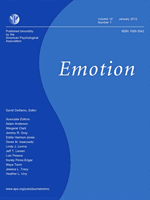
EMOTION
Charting New Territories in the Study of EmotionEMOTION is a leading peer-reviewed journal published by the American Psychological Association, focusing on the intricate dynamics of human emotions. With its ISSN 1528-3542 and E-ISSN 1931-1516, this esteemed journal has established itself as a pivotal resource in the fields of Psychology and Medicine, proudly ranking in the top quartile (Q1) according to the latest metrics and scoring a remarkable position as #22 out of 216 in the Scopus General Psychology category, placing it in the 90th percentile of its field as of 2023. Spanning from its inception in 2001 to 2024, EMOTION publishes cutting-edge research, theoretical articles, and empirical studies that advance our understanding of emotional processes and their implications for psychological well-being. While EMOTION is not an open-access journal, it remains a crucial platform for researchers, professionals, and students seeking to engage with and contribute to the burgeoning field of emotional psychology.
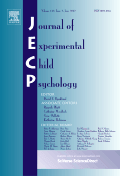
JOURNAL OF EXPERIMENTAL CHILD PSYCHOLOGY
Elevating Educational Practices with Groundbreaking ResearchJOURNAL OF EXPERIMENTAL CHILD PSYCHOLOGY, published by Elsevier Science Inc, stands as a premier outlet for high-quality research in the fields of Developmental and Educational Psychology and Experimental and Cognitive Psychology. With an impressive impact factor and recognized within the Q1 category for both developmental and experimental psychology, this journal is dedicated to advancing our understanding of child psychology through rigorous empirical research and theoretical contributions. Indexed with an ISSN of 0022-0965 and E-ISSN 1096-0457, it is a vital resource for scholars aiming to explore the complexities of children's cognitive, social, and emotional development from 1964 to 2024. Engaging with this journal provides researchers, professionals, and students access to cutting-edge findings that inform practice, policy, and future studies in the ever-evolving landscape of child psychology.

DEVELOPMENTAL NEUROPSYCHOLOGY
Unlocking the Secrets of Developmental NeuropsychologyDEVELOPMENTAL NEUROPSYCHOLOGY (ISSN: 8756-5641; E-ISSN: 1532-6942) is a pivotal peer-reviewed journal published by ROUTLEDGE JOURNALS, TAYLOR & FRANCIS LTD in the United Kingdom. Since its inception in 1985, this esteemed journal has been dedicated to advancing the understanding of developmental processes that influence neuropsychological outcomes in children and adolescents. With a focus on the integration of psychological and neuropsychological perspectives, it serves as a vital resource for researchers, clinicians, and educators alike. The journal's current impact factor and its placement in the third quartile for both Developmental and Educational Psychology and Neuropsychology categories underscore its significance in the field, as it ranks in the 45th percentile in both Scopus ranks. While DEVELOPMENTAL NEUROPSYCHOLOGY does not offer open access, it presents crucial research findings and theoretical advancements that cater to professionals seeking to deepen their knowledge and application of developmental neuropsychology until 2024. By fostering dialogue among scholars and practitioners, this journal contributes meaningfully to the ongoing evolution of clinical practices and educational strategies targeting neurodevelopmental trajectories.
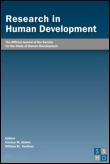
Research in Human Development
Fostering Knowledge in Social and Developmental ContextsResearch in Human Development is a distinguished academic journal published by Routledge Journals, Taylor & Francis Ltd, focusing on the intricate processes of human development across various contexts. Established to meet the evolving needs of researchers and practitioners, this journal provides a platform for innovative studies within the fields of Developmental and Educational Psychology and Social Psychology. With its solid standing, as reflected by its 2023 Q2 classification in both categories and impressive Scopus rankings—#112 in Social Psychology and #133 in Developmental and Educational Psychology—this journal occupies a significant position in the academic landscape. The research published here is instrumental for those seeking to advance their understanding of psychological development and its social implications. Although it does not currently offer open access, the journal invites academics, students, and professionals to engage with its compelling content, which spans from 2010 to 2024 and promises to contribute substantially to the discourse in human development.